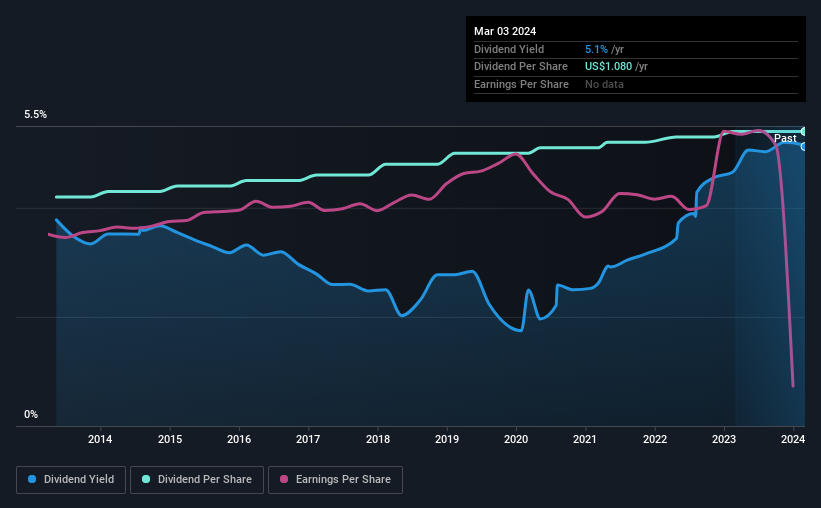Don't Buy Auburn National Bancorporation, Inc. (NASDAQ:AUBN) For Its Next Dividend Without Doing These Checks
Auburn National Bancorporation, Inc. (NASDAQ:AUBN) is about to trade ex-dividend in the next 3 days. The ex-dividend date is usually set to be one business day before the record date which is the cut-off date on which you must be present on the company's books as a shareholder in order to receive the dividend. The ex-dividend date is important because any transaction on a stock needs to have been settled before the record date in order to be eligible for a dividend. Meaning, you will need to purchase Auburn National Bancorporation's shares before the 7th of March to receive the dividend, which will be paid on the 25th of March.
The company's next dividend payment will be US$0.27 per share, on the back of last year when the company paid a total of US$1.08 to shareholders. Looking at the last 12 months of distributions, Auburn National Bancorporation has a trailing yield of approximately 5.1% on its current stock price of US$21.08. If you buy this business for its dividend, you should have an idea of whether Auburn National Bancorporation's dividend is reliable and sustainable. So we need to check whether the dividend payments are covered, and if earnings are growing.
Check out our latest analysis for Auburn National Bancorporation
Dividends are typically paid out of company income, so if a company pays out more than it earned, its dividend is usually at a higher risk of being cut. An unusually high payout ratio of 271% of its profit suggests something is happening other than the usual distribution of profits to shareholders.
When a company pays out a dividend that is not well covered by profits, the dividend is generally seen as more vulnerable to being cut.
Click here to see how much of its profit Auburn National Bancorporation paid out over the last 12 months.
Have Earnings And Dividends Been Growing?
Companies with falling earnings are riskier for dividend shareholders. If earnings decline and the company is forced to cut its dividend, investors could watch the value of their investment go up in smoke. Auburn National Bancorporation's earnings per share have plummeted approximately 30% a year over the previous five years.
Another key way to measure a company's dividend prospects is by measuring its historical rate of dividend growth. Auburn National Bancorporation has delivered 2.5% dividend growth per year on average over the past 10 years. The only way to pay higher dividends when earnings are shrinking is either to pay out a larger percentage of profits, spend cash from the balance sheet, or borrow the money. Auburn National Bancorporation is already paying out 271% of its profits, and with shrinking earnings we think it's unlikely that this dividend will grow quickly in the future.
To Sum It Up
Should investors buy Auburn National Bancorporation for the upcoming dividend? Earnings per share are in decline and Auburn National Bancorporation is paying out what we feel is an uncomfortably high percentage of its profit as dividends. Generally we think dividend investors should avoid businesses in this situation, as high payout ratios and declining earnings can lead to the dividend being cut. These characteristics don't generally lead to outstanding dividend performance, and investors may not be happy with the results of owning this stock for its dividend.
Although, if you're still interested in Auburn National Bancorporation and want to know more, you'll find it very useful to know what risks this stock faces. For example, we've found 4 warning signs for Auburn National Bancorporation (1 is a bit unpleasant!) that deserve your attention before investing in the shares.
Generally, we wouldn't recommend just buying the first dividend stock you see. Here's a curated list of interesting stocks that are strong dividend payers.
Have feedback on this article? Concerned about the content? Get in touch with us directly. Alternatively, email editorial-team (at) simplywallst.com.
This article by Simply Wall St is general in nature. We provide commentary based on historical data and analyst forecasts only using an unbiased methodology and our articles are not intended to be financial advice. It does not constitute a recommendation to buy or sell any stock, and does not take account of your objectives, or your financial situation. We aim to bring you long-term focused analysis driven by fundamental data. Note that our analysis may not factor in the latest price-sensitive company announcements or qualitative material. Simply Wall St has no position in any stocks mentioned.

